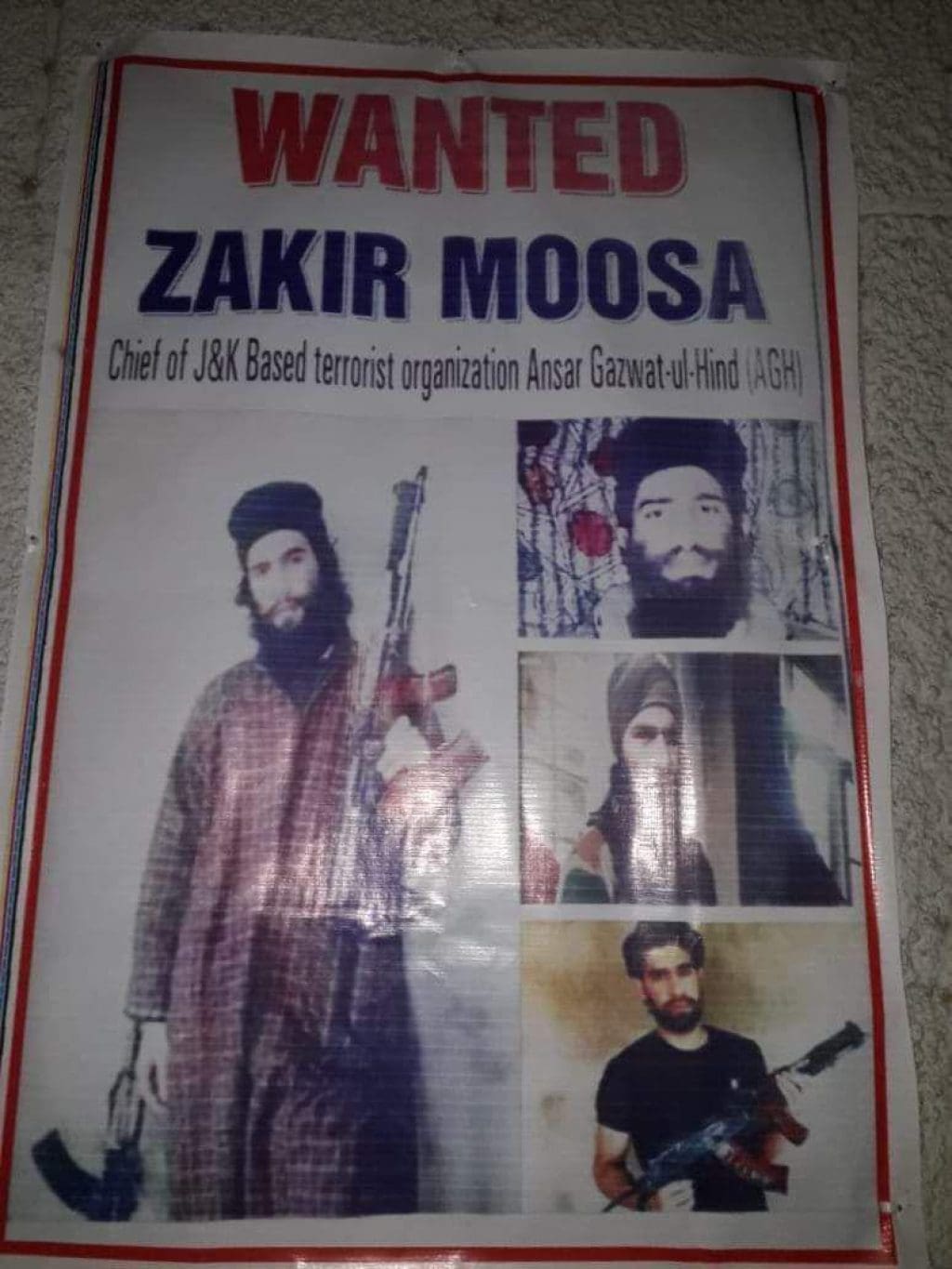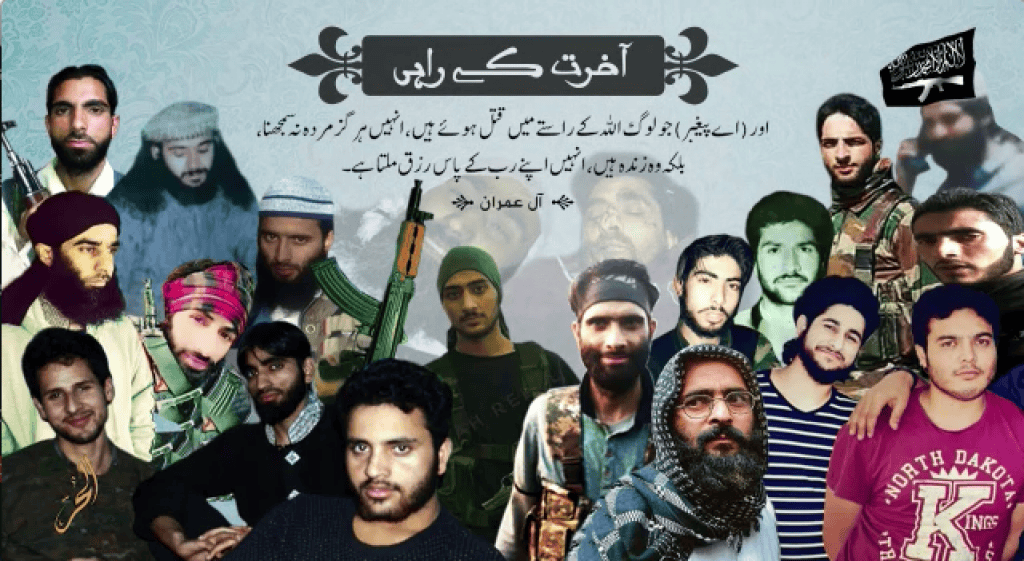
Zakir Musa, a charismatic jihadist leader in Kashmir, has been killed, according to multiple reports. Indian forces say they surrounded Musa in a village in South Kashmir, eventually killing him after a firefight during which he refused to surrender.
Thousands of protesters and mourners turned out for Musa’s funeral earlier today, an indication of his own popularity, as well as the widespread anger with Indian forces.
Musa had been one of India’s most wanted terrorists, as he attempted to fuse a popular discontent with al Qaeda-style jihadism.
On Twitter, the Jammu & Kashmir Police lauded Musa’s death as “a major success against terrorism.” He had been active for “six years,” or since approximately 2013, and “was involved in number of terrorist activities.” Musa had “rocket, grenade launchers, projectiles, huge ammunition and war like stores” in his possession, the J&K Police said.
Musa led Ansar Ghazwat-ul-Hind (AGH), an al-Qaeda linked outfit that was established in 2017. His death comes at a time when upstart groups, such as AGH, are attempting to reboot the jihad in Kashmir.
AGH has been competing with groups traditionally backed by the Pakistani state, as well as an upstart Islamic State “province,” for support.

Musa was originally a member of Hizbul Mujahideen (HM), which has received Pakistani patronage. He was a close comrade of Burhan Wani, another popular, young jihadist commander. Wani was killed by Indian forces in 2016, and Musa picked up his banner.
Musa and a band of his supporters broke away from HM, accusing his former comrades of being puppets of the Pakistani Army and criticizing them for failing to seek the implementation of sharia law.
Musa expanded this critique to cover all of the Pakistani-backed groups focused on Kashmir. He adopted the motto “Shariyat ya Shahadat,” meaning “Sharia [Islamic Law] or Martyrdom,” as a way to distinguish his efforts from the supposedly more nationalist-focused, Pakistani-sponsored groups.
Supporters spliced Musa’s first messages together with various al Qaeda-related images. Social media sites have also shared stylized photos of him, wearing fatigues and a cheap digital watch favored by jihadists, in various locations. This early media was amateurish, but Musa’s propaganda output received a small upgrade when AGH was established in mid-2017.
AGH’s propaganda arm is Al Hurr Media, which infrequently produces audio messages and written statements. Messages from Musa were typically accompanied by still images of the AGH leader, standing in a formal pose.
In an audio message released on Aug. 31, 2017, Musa stressed that his organization is opposed to “the slaves of America” in the Pakistani Army and government, which has supposedly “betrayed” Muslims and the “mujahideen” fighting in Kashmir. He declared war against the Indian army, the “apostate” police in Kashmir, the Government of India and all of its officials.
Musa added that he and his men love all the Muslims who seek to unite Afghanistan, Pakistan, India and the “whole subcontinent under the banner of Islam” and monotheism. It is for this purpose that AGH was created, free from the “shackles” of the Pakistani government and the “Indian cow worshippers.”
At times, there has been some confusion regarding Musa’s loyalty. For instance, The New York Times reported today that AGH was “an affiliate of the Islamic State in India,” even though Musa “was the first Kashmiri militant to pledge allegiance to Al Qaeda.”
But under Musa’s leadership, AGH was not affiliated with the Islamic State. It was part of al Qaeda’s effort to create a jihadi presence in Kashmir that isn’t beholden to the Pakistani state. Although AGH has not been publicly recognized as a part of al Qaeda’s network, there are various indications that the group is indeed part of its web. [See, for example, FDD’s Long War Journal report: Al Qaeda-linked jihadist in Kashmir criticizes Pakistani Army.]
AGH’s agenda has mirrored Al Qaeda in the Indian Subcontinent’s (AQIS) program.
In June 2017, AQIS released its “code of conduct,” which called on all jihadist groups, including those operating in Kashmir, to shed their dependence on the Pakistani state.
AGH released its own founding statement the following month. The document was disseminated by the Global Islamic Media Front (GIMF), which translates and helps produce media for al Qaeda and its branches around the globe. “After the martyrdom of heroic Mujahid Burhan Wani, the jihad in Kashmir has entered a stage of awakening, as the Muslim Nation of Kashmir has committed to carry the flag of jihad to repel the aggression of tyrant Indian invaders, and through jihad, and with the aid of Allah…we will liberate our homeland Kashmir,” the statement read.
Then, in Aug. 2017, AGH released a three–page statement, emphasizing that it is “free from the influence of all” intelligence agencies. As FDD’s Long War Journal previously noted, the message was entirely consistent with the argument advanced by AQIS in its code of conduct.
Musa returned to the same theme once again last month, when he released another audio message, claiming that the mujahideen needed to free themselves from the clutches of the “traitors who backstabbed the Jihad.”
AGH’s Al Hurr Media has produced other occasional statements as well. In Nov. 2018, the group released “Security Guidelines for the Mujahideen in Kashmir.” Followers were informed that “secrecy” is the “most important principle” and information should only be shared on a “need to know” basis. The jihadists shouldn’t rely on the help of civilians for their “hideouts,” should keep their “movement limited, as much as possible,” “[s]tay away from residential areas,” use mobile phones sparingly, and communicate via “encrypted apps.”
In the end, none of these security tips saved Zakir Musa.

In Dec. 2018, Al Hurr produced a short video commemorating various “martyrs.” A screen shot from the production can be seen above. In the coming weeks, it is likely that Al Hurr will produce a “martyrdom” statement or video for Musa. Al Qaeda may as well.







